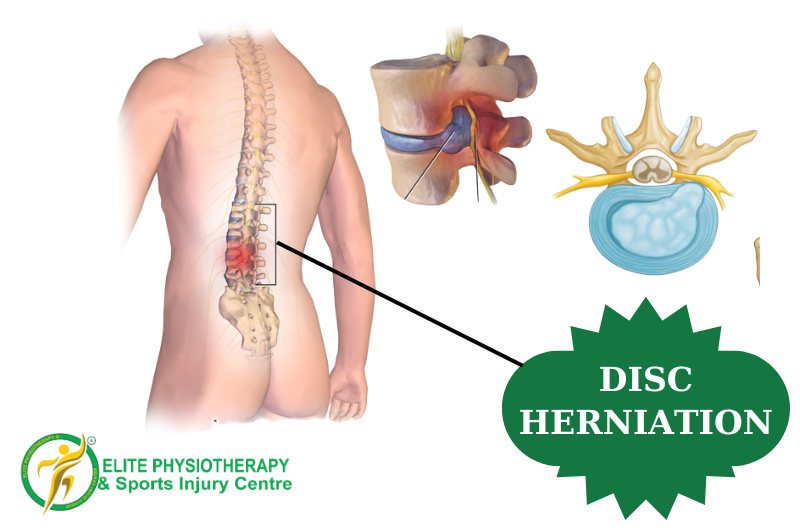
Herniated Or Slipped Disc
A herniated disc can be a painful and debilitating condition, but with the right care and support, most people can manage their symptoms effectively and return to their normal activities. If you’re experiencing back pain or suspect you might have a herniated disc, seeking professional advice and treatment is essential for your long-term health.
Questions
What is a herniated disc, and how does it occur?
When a soft, jelly-like center of a spinal disc "nucleus pulposus" is displaced from the tougher outer layer "annulus fibrosus ", the result is a herniated disc in the spine. It frequently results in back discomfort. Patients who suffer from pain associated with a herniated disc frequently recall an incident that set off their pain. Herniated disc pain, in contrast to mechanical back pain, frequently feels scorching or stinging and can go down to the lower extremities. Moreover, in more severe situations, weakness or alterations in feeling may be related.
What are the Causes of a herniated disc?
1. The degenerative process is the most frequent cause of disc herniation (as people age, the nucleus pulposus weakens and loses moisture, which can cause progressive disc herniation).
2. Trauma is the second most frequent cause of disc herniation.
3. Congenital conditions including short pedicles and connective tissue diseases are other reasons.
What are the symptoms of a herniated disc?
Depending on where the herniated disc is and if a nerve is being compressed, different symptoms may be experienced. Typical signs and symptoms include of:
1. Pain: Depending on the afflicted location, localized pain in the neck or back. The arms or legs may also become affected by pain.
2. Numbness or tingling: Many people report feeling numb or tingly in the body portions that the afflicted nerves supply.
3. Weakness: The afflicted limbs may have muscular weakness, making it difficult to grasp onto things or conduct daily duties.
4. Sciatica: The term "sciatica" refers to the shooting pain that shoots down one leg when a lower back herniation compresses the sciatic nerve.
How is a herniated disc diagnosed?
For diagnosis of herniated disc our qualified physiotherapist begin with physical examination and reviewing your medical history. Then they will conduct some neurological examination to test your muscle strength, reflexes and sensory responses.
Then they willl perform some special tests:
1. For Cervical disc herniation : They will do Spurling test, distraction test, ULTT, Tinel's test, etc.2. For Lumbar disc herniatin: They will do SLR test, Bowstring test, Prone knee bending test, etc.
They may also recommend some radiological examination such as X-ray, or MRI.
What treatment options are available for a herniated disc?
The degree of symptoms and the individual demands of the patient determine the different treatment choices. They may consist of:
1. Conservative Treatment: With time and conservative measures, the majority of herniated discs heal. This might involve corticosteroid injections, painkillers, anti-inflammatory drugs, physiotherapy, exercise, and rest.
2. Physiotherapy: A focused program of physiotherapy can help relieve pain, increase flexibility, and strengthen the muscles around the spine. To aid with healing, therapists may employ methods including manual therapy, Electrotherapy, and exercise.
3. Surgery: If non-surgical measures are not successful in relieving symptoms or if the herniated disc is seriously impairing neurological function, surgery may be necessary. Spinal fusion or discectomy (removal of the herniated section of the disc) may be advised.
What are the Physiotherapy Treatment available for Herniated Disc?
Physiotherapy is one of the best conservative treatment for herniated disc
The main aim for physiotherapy treatments are:
1. Pain control.
2. Reduce Neurological symptoms.
3. Make person functionally active.
4. Prevent recurrence.Physiotherapy treatment includes:
Active Exercises:
1. Aerobic exercises.
2. McKenzie exercises.
3. Stretching.
4. Proprioception, coordination and balancing exercise.
5. Strengthening exercise.
6. Motor control exercise.Manual Treatment:
1. Spinal mobilization and manipulation.
2. Soft tissue mobilization.
3. Cupping therapy.
4. Dry needling.
5. Traction.Electro therapy and Modalities:
1. TENS
2. Ultrasound.
3. Cryotherapy.
4. Laser therapy.How can Elite Physiotherapy and Sports Injury Centre help with a herniated disc?
At Elite Physiotherapy and Sports Injury Centre, we offer comprehensive care tailored to your needs. Our team of experienced physiotherapists and specialists uses evidence-based techniques to help alleviate pain, improve function, and support recovery. We provide personalized treatment plans that include manual therapy, targeted exercises, and lifestyle advice to ensure optimal outcomes. Whether you’re dealing with a recent injury or chronic pain, we’re here to guide you through your recovery journey.
